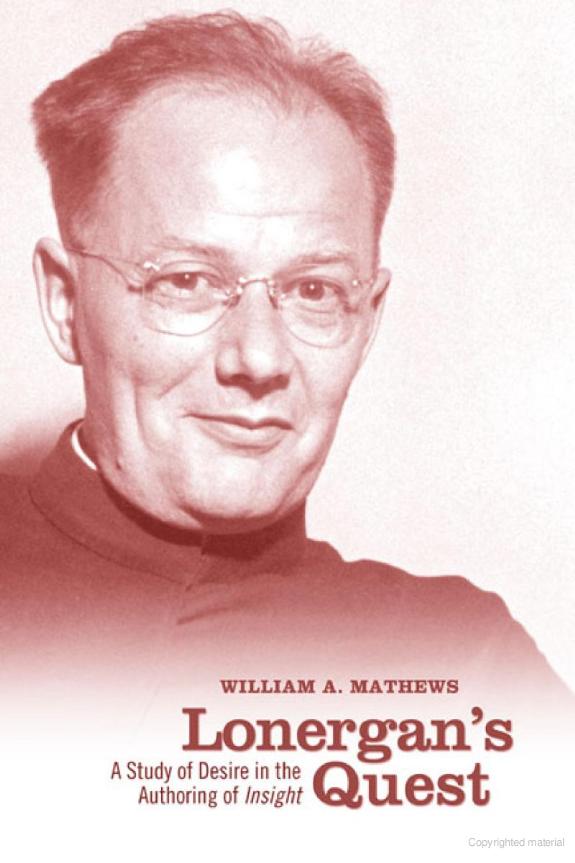
AnthonyFlood.com
Philosophy against Misosophy

Bias, Liberation, and Cosmopolis
Bernard J. F. Lonergan, S.J.
8.4 Reversal of the Longer Cycle
What is the higher principle? Since we have not as yet discussed such notions as truth and error, right and wrong, human science and philosophy, culture and religion, our immediate answer can be no more than a series of notes.
In the first place, there is such a thing as progress and its principle is liberty.
There is progress, because practical intelligence grasps ideas in data, guides activity by the ideas, and reaches fuller and more accurate ideas through the situations produced by the activity.
The principle of progress is liberty, for the ideas occur to the man on the spot, their only satisfactory expression is their implementation, their only adequate correction is the emergence of further insights; on the other hand, one might as well declare openly that all new ideas are taboo, as require that they be examined, evaluated, and approved by some hierarchy of officials and bureaucrats; for members of this hierarchy possess authority and power in inverse ratio to their familiarity with the concrete situations in which the new ideas emerge; they never know whether or not the new idea will work; much less can they divine how it might be corrected or developed; and since the one thing they dread is making a mistake, they devote their energies to paper work and postpone decisions.
However, while there is progress and while its principle is liberty, there also is decline and its principle is bias.
There is the minor principle of group bias which tends to generate its own corrective.
There is the major principle of general bias and, though it too generates its own corrective, it does so only by confronting human intelligence with the alternative of adopting a higher viewpoint or perishing.
To ignore the fact of decline was the error of the old liberal views of automatic progress. The far more confusing error of Marx was to lump together both progress and the two principles of decline under the impressive name of dialectical materialism, to grasp· that the minor principle of decline would correct itself more rapidly through class war, and then to leap gaily to the sweeping conclusion that class war would accelerate progress.
What, in fact, was accelerated was major decline which in Russia and Germany leaped to fairly thorough brands of totalitarianism.
The basic service of the higher viewpoint will be a liberation from confusion through clear distinctions. Progress is not to be confused with decline; the corrective mechanism of the minor principle of decline is not to be thought capable of meeting the issues set by the major principle.
Secondly, as there are sciences of nature, so also there is a science of man.
As the sciences of nature are empirical, so also the science of man is empirical; for science is the resultant of an accumulation of related insights, and scientific insights grasp ideas that are immanent not in what is imagined but in what is given.
If the sciences of nature can be led astray by the blunder that the objective is, not the verified, but the ‘out there’, so also can the human sciences; but while this blunder in physics yields no more than the ineptitude of Galileo’s primary qualities and Newton’s true motion, it leads zealous practitioners of scientific method in the human field to rule out of court a major portion of the data and so deny the empirical principle. Durkheimian sociology and behaviourist psychology may have excuses for barring the data of consciousness, for there exist notable difficulties in determining such data; but the business of the scientist is not to allege difficulties as excuses but to overcome them, and neither objectivity in the sense of verification nor the principle of empiricism can be advanced as reasons for ignoring the data of consciousness.
Further, as mathematics has to deal not only with direct intelligibilities but also with such inverse instances as primes, surds, imaginaries, continua, and infinities, as the physicist has to employ not only the classical procedures and techniques that deal with the systematic but also the statistical procedures and techniques that take into account the non-systematic, so also human science has to be critical.
It can afford to drop the nineteenth-century scientific outlook of mechanist determinism in favour of an emergent probability.
It can profit by the distinction between the intelligible emergent probability of prehuman process and the intelligent emergent probability that arises in the measure that man succeeds in understanding himself and in implementing that understanding.
Finally, it can be of inestimable value in aiding man to understand himself and in guiding him in the implementation of that understanding, if, and only if, it can learn to distinguish between progress and decline, between the liberty that generates progress and the bias that generates decline.
In other words, human science cannot be merely empirical; it has to be critical; to reach a critical standpoint, it has to be normative.
This is a tall order for human science as hitherto it has existed. But people looking for easy tasks had best renounce any ambition to be scientists; and if mathematicians and physicists can surmount their surds, the human scientist can learn to master his.